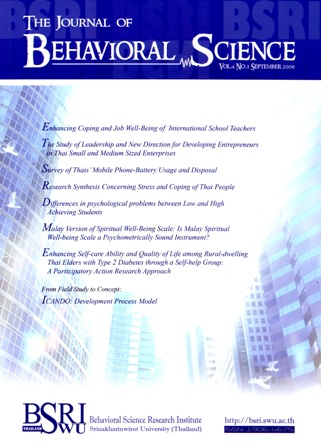Research Synthesis Concerning Stress and Coping of Thai People
Main Article Content
Abstract
The objectives of this research synthesis were to summarize the progress and development of research studies concerning stress and coping of Thai people, and to search for factors affecting stress and coping by synthesizing from research, dissertation, and minor thesis. The sample consisted of 490 research studies of 15 higher education institutions on the subject of stress and coping during 1982-2007. Qualitative data was synthesized by content analysis presented in percentages. Quantitative data was synthesized by estimating effect sizes through Meta analysis techniques of Glass, et al. Research synthesis results showed that the majority of research had objectives to find correlation and predictors – at 80%. The reliability coefficient ranges of stress questionnaires and coping questionnaires were 0.7000-0.9800 and 0.6033-0.9500 respectively. Levels of stress and appropriate coping were at moderate, at 55.41% and 49.50% respectively. The majority of samples studied were government officials: nurses, teachers, lecturers, and policemen. Furthermore, factors that affected stress and coping consisted of 4 groups. Factors with influence on stress were: 1) Bio-social and personal factors, at the average effect size of 0.1609-0.0559, of which the highest predictor was physical disability; 2) Psychological factors, at the average effect size of 0.2637-1.6450, of which the highest predictor was anxiety; 3) Social factors, at the average effect size of 0.2118-0.9725, of which the highest predictor was education reform; 4) Intervention program, of which the highest effect on stress was self-control practice. Factors with influence on coping were: 1) Bio-social and personal factors, at the average effect size of 0.1214-0.3551, of which the highest predictor was residence location; 2) Psychological factors, at the average effect size of 0.1201-1.0208, of which the highest predictor was expectation; 3) Social factors, at the average effect size of 0.1635-0.7144, of which the highest predictor was workplace support; 4) Intervention program, of which the highest effect on coping was cartoon-pictured information program.


